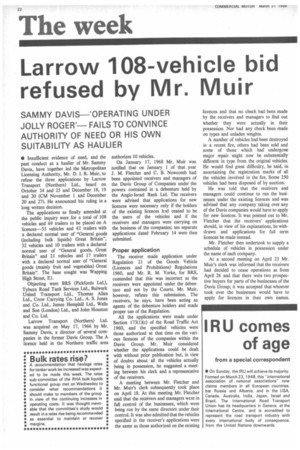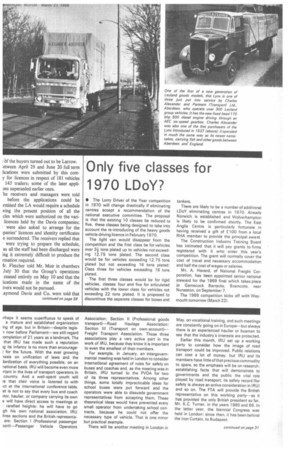Larrow 108-vehicle bid refused by Mr. Muir
Page 24

Page 25

If you've noticed an error in this article please click here to report it so we can fix it.
• Insufficient evidence of need, and the past conduct as a haulier of Mr. Sammy Davis, have together led the Metropolitan Licensing Authority, Mr. D. I. R. Muir, to refuse the three applications by Larrow Transport (Northern) Ltd., heard on October 24 and 25 and December 18, 19 and 20 (CM November 1 and December 20 and 27). He announced his ruling in a long written decision.
The applications as finally amended at the public inquiry were for a total of 108 vehicles and 69 trailers to be placed on A licences-55 vehicles and 42 trailers with a declared normal user of "General goods (including bulk liquids) Great Britain", 32 vehicles and 10 trailers with a declared normal user of "General goods, Great Britain" and 21 vehicles and 17 trailers with a declared normal user of "General goods (mainly fruit and vegetables) Great Britain". The base sought was Wapping High Street, El.
Objecting were BRS (Pickfords Ltd.), Tyburn Road Tank Services Ltd., Bulwark United Transport Ltd., Thomas Allen Ltd., Crow Carrying Co. Ltd., A. S. Jones and Co. Ltd., James Hemphill Ltd., Wells and Son (London) Ltd., and John Houston and Co. Ltd.
Larrow Transport (Northern) Ltd. was acquired on May 17, 1966 by Mr. Sammy Davis, a director of several companies in the former Davis Group. The A licence held in the Northern traffic area authorizes 10 vehicles.
On January 17, 1968 Mr. Muir was notified that on January 1 of that year J. M. Fletcher and C. B. Newcomb had been appointed receivers and managers of the Davis Group of Companies under the powers contained in a debenture held by the Anglo-Israel Bank Ltd. The receivers were advised that applications for new licences were necessary only if the holders of the existing licences had ceased to be the users of the vehicles and if the receivers and managers were carrying on the business of the companies; ten separate applications dated February 14 were then submitted.
Proper application The receiver made application under Regulation 21 of the Goods Vehicle (Licences and Prohibitions) Regulations 1960, and Mr. R. M. Yorke, for BRS, contended that this was incorrect as the receivers were appointed under the debenture and not by the Courts. Mr. Muir, however, refutes this submission. The receivers, he says, have been acting as agents of the debenture holders and made proper use of the Regulation.
All the applications were made under Section 173(1Xc) of the Road Traffic Act 1960, and the specified vehicles were those authorized at that time on the various licences of the companies within the Davis Group. Mr. Muir considered whether the applications could be dealt with without prior publication but, in view of doubts about all the vehicles actually being in possession, he suggested a meeting between his clerk and a representative of the receivers.
A meeting between Mr. Fletcher and Mr. Muir's clerk subsequently took place on April 18. At this meeting Mr. Fletcher said that the receivers and managers were in full control of the businesses, which were being run by the same directors under their control. It was also admitted that the vehicles specified in the receiver's applications were the same as those authorized on the existing licences and that no check had been made by the receivers and managers to find out whether they were actually in their possession. Nor had any check been made on types and unladen weights.
A number of vehicles had been destroyed in a recent fire, others had been sold and some of those which had undergone major repair might now be substantially different in type from the original vehicles. He would find great difficulty, he said, in ascertaining the registration marks of all the vehicles involved in the fire. Some 250 vehicles had been disposed of by auction.
He was told that the receivers and managers could continue to run the businesses under the existing licences and was adVised that any company taking over any of the Davis companies would have to apply for new licences. It was pointed out to Mr. Fletcher that the receivers applications should, in view of his explanations, be withdrawn and applications for full term licences be made instead.
Mr. Fletcher then undertook to supply a schedule of vehicles in possession under the name of each company.
At a second meeting on April 23 Mr. Muir's clerk was informed that the receivers had decided to cease operations as from April 26 and that there were two prospective buyers for parts of the businesses of the Davis Group; it was accepted that whoever took over the businesses would have to apply for licences in their own names.
: bf the buyers turned out to be Larrow. etween April 29 and June 20 full term lications were submitted by this corny for licences in respect of 181 vehicles 145 trailers; some of the later appliDns superseded earlier ones.
he receivers and managers were told before the applications could be rmined the LA would require a schedule ,ving the present position of all the cles which were authorized on the varilicences held by the Davis companies: • were also asked to arrange for the [parties' licences and identity certificates e surrendered. The receivers replied that were trying to prepare the schedule, as all the staff had been discharged were ing it extremely difficult to produce the rmation required.
Ir. Fletcher told Mr. Muir in chambers July 30 that the Group's operations ceased entirely on May 10 and that the ications made in the name of the ivers would not be pursued.
.aymond Davis and Co. were told that
























































































































